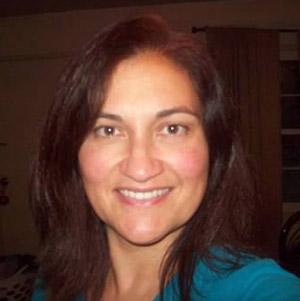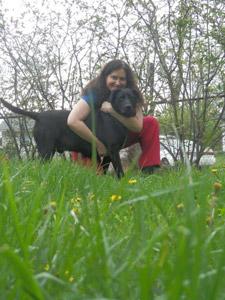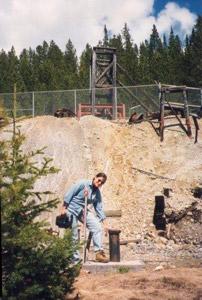Meet EPA Scientist Diana Bless

EPA chemical engineer Diana Bless works on sustainable materials management research for rare earth elements in consumer electronics and approaches related to characterization, source control and treatment of mining-influenced waters. She was born and raised in Venezuela and speaks both English and Spanish fluently.
Tell me about your background
As a child, we moved around a lot because of my dad’s work. I came to the United States from Venezuela in 1983 to go to school at New Mexico State University in Las Cruces, New Mexico. I graduated in 1987 with a Bachelors of Science in Chemical Engineering and a minor in biochemical engineering. I started at EPA in 1990 and I have been working here ever since.
When did you know you wanted to become a scientist?
I always liked science. I had that yearning to know more about science but I didn’t have that ‘a-ha moment’ until I went to college and I realized I also liked math and could be a chemical engineer. In high school I knew I wanted to do something environmental because the lake we lived next to in Venezuela was really contaminated and I used to think “this could be a lot better.” And then in college I used to think “I wonder if I could work for the EPA”—and now here I am!
How does your science matter?
Right now the work that I am doing is based on the rare earth elements which is a group of 17 chemical elements in the periodical table. These elements rarely occur in the earth’s crust in concentrated form so processing them is very costly. Currently, China controls approximately 95% of the world’s rare earth elements. Rare earth elements play an essential role in today’s high technology. A lot of these elements are critical components of hybrid vehicles, wind turbines, computers, cellphones, and much more. My research focuses on their environmental impacts and understanding how these materials can be managed sustainably throughout their life cycle. How do we reduce our dependence on China for these materials? Maybe we can create substitutes or recycle the rare earths efficiently so we can keep our resources within reach?
What do you like most about your research?
My work in sustainability is what I like about my research most. I think it’s important to provide decision tools and data that will prevent a problem instead of fixing a problem that’s already occurred. If the problem has already occurred as in heavy metal mining influenced waters, it is great to be able to assist regional program managers (RPMs), industry, government, and academia with available tools such as databases, handbooks, conferences, fact sheets, etc. One of the greatest things about research is working with other people. I’m lucky enough to work with other divisions and program offices and regions within EPA. You learn so much working with other groups, not only what they are currently doing but how they are doing things.
If you could have dinner with a scientist past or present, who would it be and what would you ask them?
I would pick James Dewy Watson. He’s an American molecular biologist, geneticist, and zoologist who co-discovered the structure of DNA with Francis Crick in 1953. He discovered that the DNA molecule has a double helix. I think that’s pretty amazing! I would ask Dr. Watson how he thought all of that information that makes up our DNA molecule got there in the first place. And how did the DNA molecule configure itself so perfectly to make that unique individual?
If you weren’t a scientist or engineer, what would you be?
 Bless with one of her dogs, Sam.
Bless with one of her dogs, Sam.I have two dogs at home and I think they are super awesome! I would probably have a doggy daycare where I would take care of lots of dogs. I love to observe the behavior and personality. It would be awesome to have a ton of dogs in my house.
Do you have any advice for any students considering a career in science?
Ask a lot of questions while you are in school! There is never a stupid question. The more questions you ask, the smarter you will become. Study hard, get good grades, and try to get one-on-one experience with a mentor.
What do you think is our biggest scientific challenge in the next 20/50/100 years?
I think our biggest challenge is keeping up with technological advances while keeping the world sustainable. We need to produce these technologies in a way that prevents pollution. Another challenge is dealing with food, water, and antibiotics. How do we ensure a future that will provide enough of all of these for the ever expanding population?
Whose work in your scientific field are you most impressed by?
 Bless in the field doing Mine waste treatment work.
Bless in the field doing Mine waste treatment work.I admire and respect my colleague Dr. John Glaser. He’s like a book of knowledge! You can go to him at any time and ask him any question and he just knows everything. He’s a great mentor.
If you could have one super power what would it be and why?
I would like to fly so I could see my loved ones anytime I want. And I wouldn’t have to sit in traffic—that would save so much time.
You’re stranded on a desert island with a group of other survivors—what is your job?
My first job would be to survive—try to live off of the resources available on the island. Since there are other survivors on the island, we could work together in order to sustain each other’s lives. I know that working in groups is more efficient than just working alone for certain things, so I could help organize individuals into teams that could do certain tasks like searching for food, water, and shelter. And you never know, this island could have everything we need to live there forever!
